DUBAI: Earth’s surface is 71 percent water, but the Middle East and North Africa (MENA) region sees precious little of this life-giving resource.
According to the UN, it is the world’s most water-scarce region, with 17 countries considered below the water poverty line.
Matters are made worse by booming population growth, poor infrastructure and overexploitation.
Agriculture alone accounts for around 80 percent of water usage in MENA region, according to the World Bank.

This overuse means the region’s natural groundwater reserves are not replenishing fast enough to keep pace with demand.
Desalination of seawater and major dam projects have been the favored solutions, but these come with their own environmental downsides.
Now researchers are looking for new ways to protect water supplies and encourage good conservation habits among communities, farmers and industries.
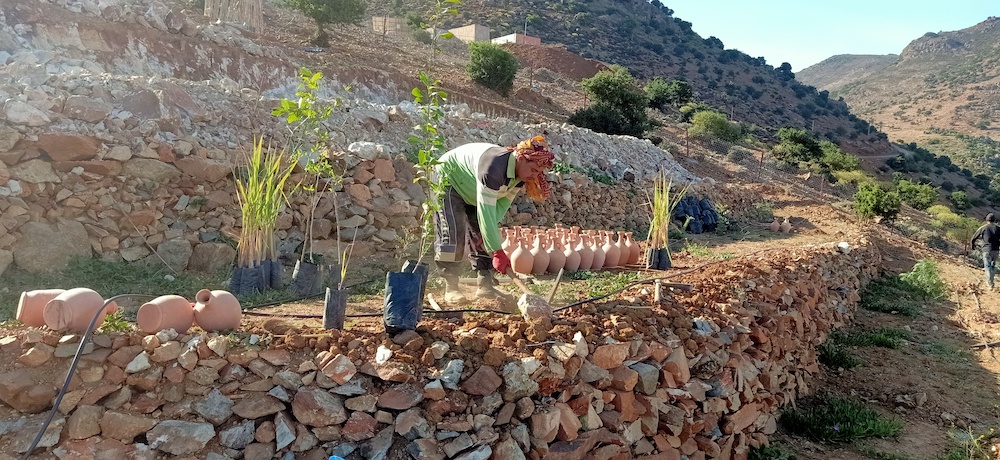
Agriculture alone accounts for around 80 percent of water usage in MENA region, according to the World Bank. (Supplied)
“There are many steps to protecting this very important vital resource, without which there’s no life,” Jamila Bargach, executive director at Moroccan NGO Dar Si Hmad for Development, Education and Culture, told Arab News.
“It’s always important to remind people of the importance of water. Some of the ways are education, reminding individual consumers that they need to protect water, and encouraging scientific research to find ways of cutting back in industry and in agriculture.”
Speaking ahead of a recent pre-Expo 2020 Dubai Thematic Week session on water, Bargach said science, research and education must work hand in hand to address water treatment and protection.
In Morocco, for instance, agricultural communities have been saving water by employing fog-harvesting techniques and by recycling brackish water.
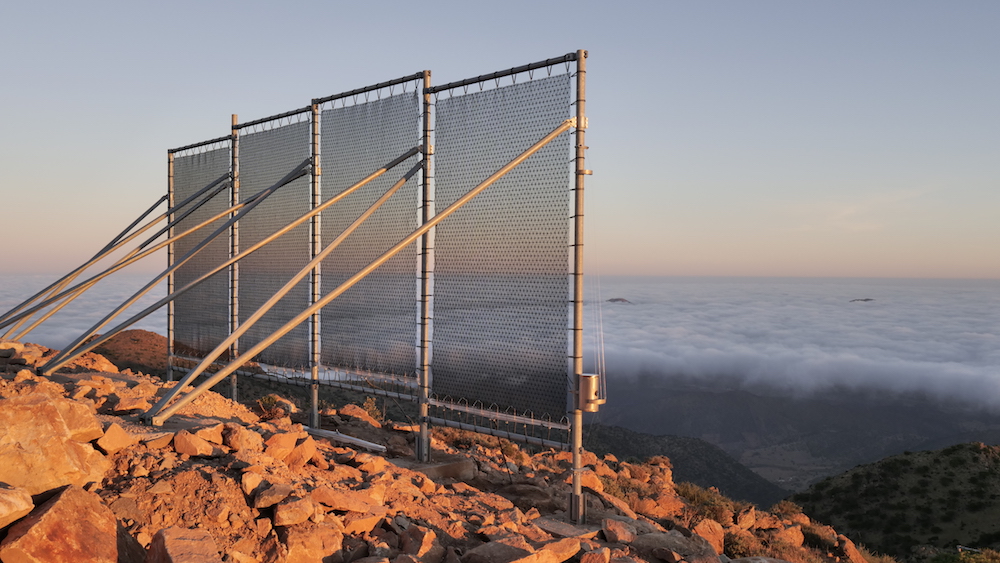
Dar Si Hmad set up CloudFisher fog-harvesters, developed by the German WaterFoundation, on Morocco’s Mount Boutmezguida. (Supplied)
“But one of the things that’s a barrier to water security is unfortunately the excessive use of water in industries,” said Bargach.
“Agriculture is a huge issue here, especially in the region where I’m in — the southern part of Morocco — which exports massive amounts of citrus fruit to Europe, and which creates a lot of labor, job and food security for populations here.”
That water levels in Morocco’s deep aquifers and man-made reservoirs were running low until the rains came a few months ago suggests that its water reserves are stretched to their absolute limit.
Bargach identified the demands of international trade as the culprit, whereby water is consumed for the cultivation of fruits for export by Morocco at a much faster rate than it can be replenished, creating a huge imbalance.
To address this, her NGO promotes the use of fog-harvested water. To date it has worked with 16 villages in rural Morocco to foster the technique, and is already working with eight more. The research was on display at the Expo’s Sustainability Pavilion.
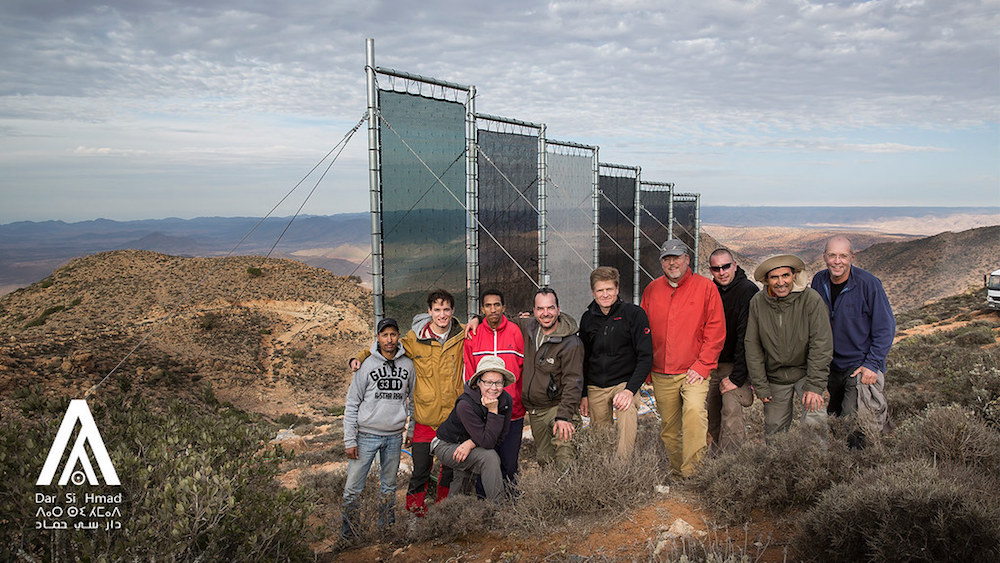
First tested on Morocco’s fog-wrapped Mount Boutmezguida, the nets use no energy whatsoever and can collect over 600 liters of drinking water per day per net. (Supplied)
Dar Si Hmad is responsible for the largest functioning fog-harvesting project in the world. The CloudFisher, developed by the German Water Foundation, harvests atmospheric water vapor from the air with synthetic fabric nets.
First tested on Morocco’s fog-wrapped Mount Boutmezguida, the nets use no energy whatsoever and can collect over 600 liters of drinking water per day per net.
“There are possibilities,” Bargach said. “But the scale at which we work is very important. The larger the scale, the more the demand and the greater the possibilities of waste embedded in the system.”
As a result, scaling down usage could be one way of conserving water. Forecasts suggest water supplies would drop dramatically by 2030 and, therefore, rationing could become the new normal.
In Morocco, this has already begun. In January, the city of Agadir, along the country’s southern Atlantic coast, saw its water cut off from 10 p.m. every night to help limit consumption.

Researchers are looking for new ways to protect water supplies and encourage good conservation habits among communities, farmers and industries. (Supplied)
“This is the reality of the future that we have to live with, that water is scarce, and that scarcity is increasing,” Bargach said.
“The planet’s patterns are changing; rainfall amount and frequency are changing; and in a lot of countries in North Africa and the Middle East, we’re using mostly rain as a way of getting water.”
Shortages could have wide-reaching humanitarian consequences. Droughts destroy livelihoods, displace populations from rural areas into cities, and in the worst-case scenario, result in conflict and unrest.
For Reem Al-Hashimy, UAE minister of state for international cooperation and managing director of the Expo 2020 Dubai bid committee, water is the lifeblood of civilizations that shapes economies, cultures and religious beliefs.
“Water is at the very core of who we are, what we do, our hopes and dreams for ourselves and for our children,” she said.
“Yet today, we face a challenge familiar to countries all across the world: Soaring demand and slowing supply.”
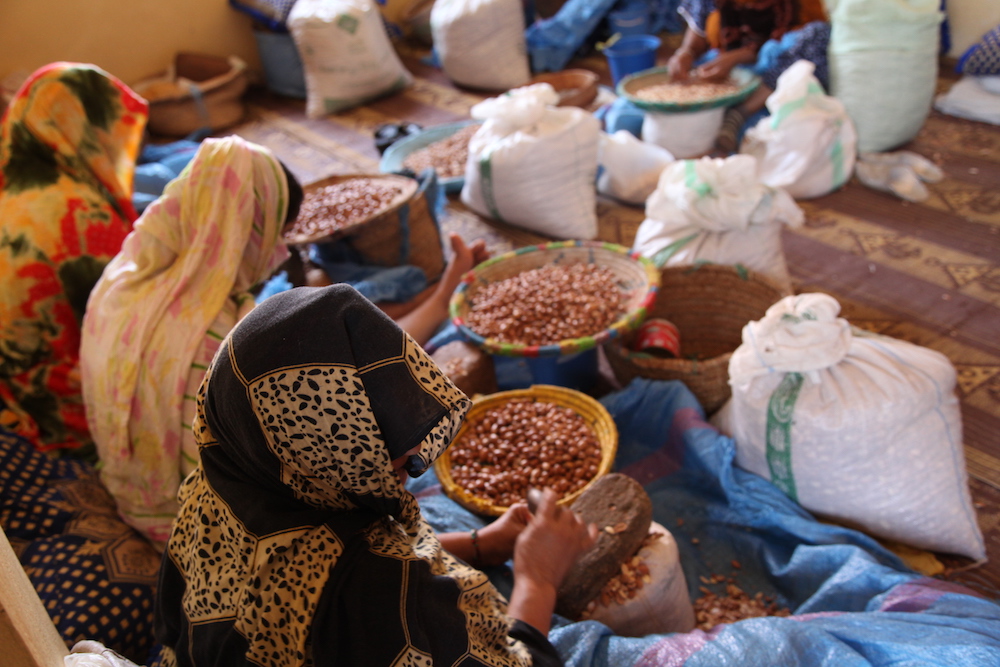
From Chennai to Cape Town and even California, many communities are increasingly feeling the effects of shortages of, and poor access to, water. (Supplied)
She warned of a looming global water crisis, with around 1.1 billion people already lacking reliable access to water, and 2.7 billion enduring scarcity for at least one month of the year. By 2025, an estimated two-thirds of the world’s population may face water shortages.
“This isn’t only an economic challenge but a question of justice, fairness and equity,” Al-Hashimy said. “How will we guarantee access to this life-sustaining resource we all need?”
From Chennai to Cape Town and even California, many communities are increasingly feeling the effects of shortages of, and poor access to, water. “Water futures are traded on Wall Street, such is the certainty of future scarcity,” said Al-Hashimy.
“The export of so-called blue gold is growing, with maritime experts foreseeing a world in which our oceans are traversed by supertankers laden not with oil, but with freshwater for countries lacking essential supplies.”

For Reem Al-Hashimy, UAE minister of state for international cooperation and managing director of the Expo 2020 Dubai bid committee, water is the lifeblood of civilizations that shapes economies. (AFP/File Photo)
She spoke of a shifting global economic center, with water at the core of ever-evolving civilizations.
The Indian Ocean, for instance, holds almost 20 percent of the water on the planet’s surface. Almost 2.7 billion people live in countries along its coast.
Its sea lanes carry half of the world’s container ships, a third of its bulk cargo traffic, and two-thirds of all oil shipments.
Its coastlines and ports are of increasing geostrategic significance, with countries jostling for influence and infrastructure development.
“The oceans are too vast, deep and untameable for any one nation or bloc to lay sole claim,” Al-Hashimy said. “Just as all the waterways of the world are interconnected, so are our own responsibilities toward the management and preservation of this priceless resource.”
She added: “We take seriously our shared commitment to the global responsibility for all open oceans, for that which belongs to no one and to everyone.”
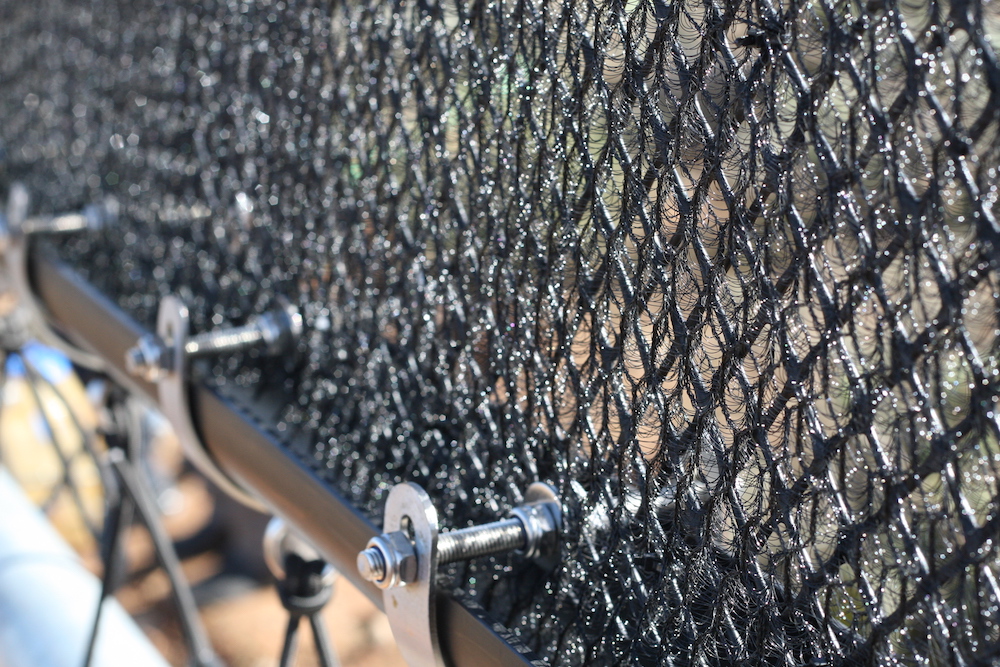
The use of fog-harvested water has been implemented in 16 villages in rural Morocco to foster the technique to date, and will be utilized in eight more. (Supplied)
Protecting water is a shared responsibility, she said, impacting everything from climate to biodiversity, inclusivity, knowledge and learning, travel, connectivity, health and wellness.
“Each is distinct in its own way, yet deeply interconnected and impactful on every human life,” she said. “No matter your place in the world, communities are increasingly afflicted by such shortages.”
Seen against this background, Expo 2020 offers governments, companies and communities the opportunity to share new technologies and approaches to resolve humankind’s shared challenges, Al-Hashimy said.
“With more than 200 nations and international organizations coming together, with millions of visitors from around the world granted a once-in-a-lifetime experience that empowers their active participation in meaningful change, this is a unique opportunity for positive impact that will last for generations to come.”
--------------------
Twitter: @CalineMalek














